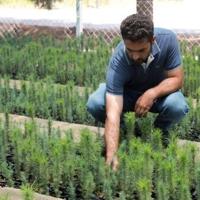In a plant nursery in northern Iraq’s autonomous Kurdistan region, saplings of different varieties grow under awnings to shield them from the hot summer sun. These include pine, eucalyptus, olive, and pomegranate trees.
The nursery in Sarchinar, Sulaimaniyah, is part of an initiative to combat the harmful impacts of deforestation in the region.
“Nearly 50 percent of forests in Kurdistan have been lost over the past 70 years,” stated Nyaz Ibrahim of the UN’s World Food Programme (WFP).
This loss is primarily attributed to factors like water scarcity, rising temperatures, irregular rainfall patterns, and incidents of forest fires.
The Kurdistan region is crucial as it hosts 90 percent of the forests in Iraq, a country heavily affected by climate change and desertification globally.
The destruction of forests is exacerbated by activities like illegal logging, forest fires, and military operations near Iraq’s northern border.
The nursery, the oldest in Iraq, actively cultivates around 40 tree varieties to be later transplanted into forests or distributed to farmers.
Agricultural engineer Rawa Abdulqader emphasized the selection of tree species that can thrive in high temperatures and require less water due to the impact of climate change.
– ‘Negligence’ –
With support from the WFP, special nets and sprinklers have been installed in the nursery to shield the trees from the sun and optimize water usage.
Since the project’s inception in late 2022, the nursery’s annual production has increased significantly, from 250,000 saplings to 1.5 million in 2024.
Over five years, the WFP aims to aid authorities and local communities in planting 38 million trees across 61,000 hectares in Kurdistan and preserving 65,000 forested hectares.
Official studies show that more than 600,000 hectares of forests were lost between 1957 and 2015, with an additional 290,000 hectares affected by fires in recent years.
According to Halkawt Ismail, director of the forestry office in Kurdistan’s agriculture ministry, negligence and illegal logging, notably during the 1990s economic crisis, have contributed to the forest shrinkage.
– Conflict and displacement –
Elsewhere in Kurdistan, forests have been casualties of clashes between the Turkish army and the Kurdistan Workers’ Party (PKK).
Forest fires have erupted due to Turkish bombardments, with the PKK accused of starting fires for strategic purposes.
The construction of multiple Turkish military outposts in Iraqi Kurdistan and activities like road-building and forest clearance have further escalated the situation.
Lack of forest supervision, along with escalating conflict and displacement issues, coupled with rising temperatures and droughts, create a fertile environment for forest fires.
These fires can be accidental due to natural causes or intentional as a result of conflict, posing a severe threat to forests.
Civil society organizations are also stepping in to counter deforestation, such as activists protecting Mount Goizha from urban development and a campaign to plant 1 million oak trees in Arbil.
“Climate change is inevitable, but adaptation is key,” emphasized Gashbin Idrees Ali, project manager of the oak tree plantation campaign.





